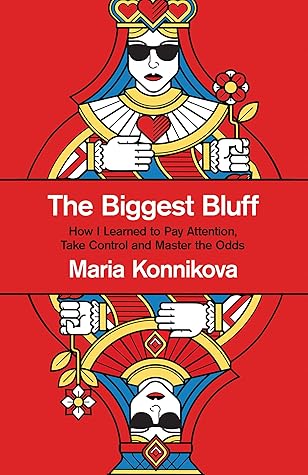More on this book
Community
Kindle Notes & Highlights
“Look, every player is going to want to tell you about the time their aces got cracked. Don’t be that player,” he continues. “Bad beats are a really bad mental habit. You don’t want to ever dwell on them. It doesn’t help you become a better player. It’s like dumping your garbage on someone else’s lawn. It just stinks.” Well, that certainly gets the point across. But aren’t I allowed to vent just a bit? As it turns out, no, no I’m not. “Focus on the process, not the luck. Did I play correctly? Everything else is just BS in our heads,” Erik tells me. “Thinking that way won’t get you anywhere.
...more
the words we select—the ones we filter out and the ones we eventually choose to put forward—are a mirror to our thinking. Clarity of language is clarity of thought—and the expression of a certain sentiment, no matter how innocuous it seems, can change your learning, your thinking, your mindset, your mood, your whole outlook. As W. H. Auden told an interviewer, Webster Schott, in a 1970 conversation, “Language is the mother, not the handmaiden of thought; words will tell you things you never thought or felt before.” The language we use becomes our mental habits—and our mental habits determine
...more
If you think of yourself instead as an almost-victor who thought correctly and did everything possible but was foiled by crap variance? No matter: you will have other opportunities, and if you keep thinking correctly, eventually it will even out. These are the seeds of resilience, of being able to overcome the bad beats that you can’t avoid and mentally position yourself to be prepared for the next time.
“Choice of attention—to pay attention to this and ignore that—is to the inner life what choice of action is to the outer. In both cases man is responsible for his choice and must accept the consequences.”
In a phenomenon known as omission neglect, we often pay attention to the barks but not to the moments when they are absent: we ignore what is omitted.
You don’t have to have studied the description-experience gap to understand, if you’re truly expert at something, that you need experience to balance out the descriptions. Otherwise, you’re left with the illusion of knowledge—knowledge without substance. You’re an armchair philosopher who thinks that just because she read an article about something she is a sudden expert.
Dunning-Kruger effect—the more incompetent you are, the less you’re aware of your incompetence—has found that people go quickly from being circumspect beginners, who are perfectly aware of their limitations, to “unconscious incompetents,” people who no longer realize how much they don’t know and instead fancy themselves quite proficient.)
It has taught me the pitfalls of the gamble, the necessity of selecting games so that you have an edge, so that you have a statistical advantage, so that your skill can win. It has taught me to avoid situations where skill falls by the wayside, where you have to rely on variance alone to break your way because you simply can’t measure up otherwise.
Here’s a free life lesson: seek out situations where you’re a favorite; avoid those where you’re an underdog. This doesn’t mean never take shots.
Don’t jump into the arms of chance and say, “Please don’t let me fall!” Don’t play above your weight class after you’ve just been punched down. It’s a question of respect for the game—and not just the game of poker.
And here’s one thing I know for sure: no matter the decision, the why shouldn’t ever be for the simple glory of saying you’ve done something. At least to me, right now, that’s not good enough.
He called it irrational perseverance: “Facing a choice, we gave up rationality rather than give up the enterprise.” In what’s known as the planning fallacy, we tend to be overly optimistic when we map out timelines, goals, targets, and other horizons. We look at the best-case scenario instead of using the past to determine what a more realistic scenario would look like.
your edge is your edge only if you’re playing your best game. To play your best game, you need to be your best you.
Never feel like you have to do something just because it’s expected of you—even if you’re the one who expects it of you. Know when to step back. Know when to recalibrate. Know when you need to reassess your strategy, prior plans be damned.


